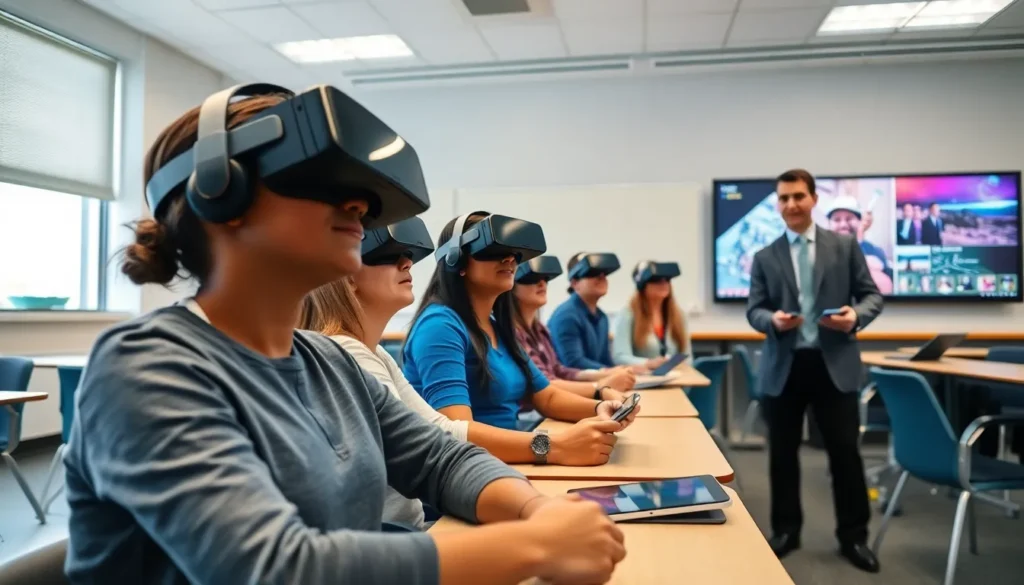Table of Contents
ToggleIn an era buzzing with technological chatter, emerging technologies have become the talk of the town, like that elusive celebrity everyone wants to be seen with. It’s not just a passing trend: these innovations are set to reshape our world, influencing everything from how we communicate to the very fabric of our economies. Strap in, folks, as we explore the powerful impacts of these tech marvels. Trust me, it’s going to be a wild ride.
Understanding Emerging Technologies

Emerging technologies refer to new innovations that are currently being developed or will be developed within the next five to ten years and have the potential to disrupt societal norms significantly. Think of it as the tech industry’s version of a growth spurt, sudden and game-changing. These advancements aren’t just limited to flashy gadgets: they encompass advancements in artificial intelligence, biotechnology, robotics, quantum computing, and more.
To put it simply, they represent the cutting edge, the front line of innovation. Often characterized by their exponential growth and transformative potential, emerging technologies promise benefits that could revolutionize industries, redefine job markets, and elevate human experiences across the globe.
Key Examples Of Emerging Technologies
Many emerging technologies are currently making waves, each with unique capabilities and applications. Here are a few key players in the field:
Artificial Intelligence (AI)
AI isn’t just a buzzword anymore. It’s actively transforming industries with applications in healthcare, finance, and even entertainment. From predictive analytics to natural language processing, AI is the brain behind countless innovations.
Quantum Computing
This isn’t your average computer upgrade. Quantum computing promises processing power far beyond traditional computers, potentially solving complex problems in seconds that might take today’s supercomputers years.
Biotechnology
CRISPR technology is an excellent example of biotechnology’s booming capabilities, allowing for genetic modifications that could cure diseases or improve agricultural efficiency.
Virtual and Augmented Reality (VR/AR)
These immersive tech forms are redefining how we experience entertainment, education, and even business. Imagine collaborating with colleagues in a virtual space, regardless of your physical location.
Economic Impacts Of Emerging Technologies
The economic implications of emerging technologies are monumental. They can drive efficiencies and create new markets and opportunities. For businesses, these technologies can lead to cost savings, improving productivity by automating mundane tasks.
Also, they are creating entirely new sectors. The rise of AI and machine learning, for instance, has led to a surge in job opportunities in tech fields, research, and development. But, it’s crucial to note that such transformations come with challenges, as some jobs may become obsolete, requiring workers to adapt or reskill.
Social Implications Of Emerging Technologies
The social fabric of society is being woven and unwoven through emerging technologies. Social media platforms, powered by AI algorithms, influence how individuals interact, consume news, and shape public opinions. While connectivity has never been easier, it also brings concerns over privacy and misinformation.
Emerging technologies can also enhance accessibility for those with disabilities, enabling more inclusive experiences in various sectors, including education and employment. But, disparities in access to these technologies can exacerbate existing inequalities. This digital divide underscores the need for equitable access policies.
Environmental Considerations
As we embrace the rapid development of emerging technologies, environmental considerations cannot be overlooked. Renewable energy technologies, such as solar and wind power innovations, are critical in the fight against climate change. They offer sustainable alternatives to fossil fuels and promise a cleaner future.
Also, emerging technologies in waste management and recycling can significantly reduce environmental footprints. But, the production of cutting-edge technologies often requires substantial resources, leading to concerns over e-waste and sustainability. Balancing innovation with responsibility is essential.
Challenges And Risks Associated With Emerging Technologies
Even though their potential benefits, emerging technologies bring along a myriad of challenges and risks. Cybersecurity threats are at the forefront as more devices become interconnected. The incidence of cyberattacks could rise, posing significant risks to individual privacy and organizational security.
Besides, ethical dilemmas abound, especially with AI and biotechnology. Questions arise about data privacy, the potential for bias in algorithms, and the moral implications of genetic modifications. Regulatory frameworks are struggling to keep pace with the rapid changes, making a deep understanding of these implications crucial for society.
Future Outlook
Looking ahead, the future of emerging technologies appears both exciting and daunting. Experts predict that we are on the brink of breakthroughs that will reshape entire industries. As quantum computing becomes more mainstream, it will have implications for everything from cryptography to drug discovery.
Artificial intelligence’s integration into everyday life is expected to deepen, enhancing automation in various sectors and personalizing user experiences. But, a careful approach is crucial to mitigate potential job disruptions and ethical challenges. As society embraces these changes, collaboration between tech innovators, governments, and communities will be essential to navigate this uncharted territory.




